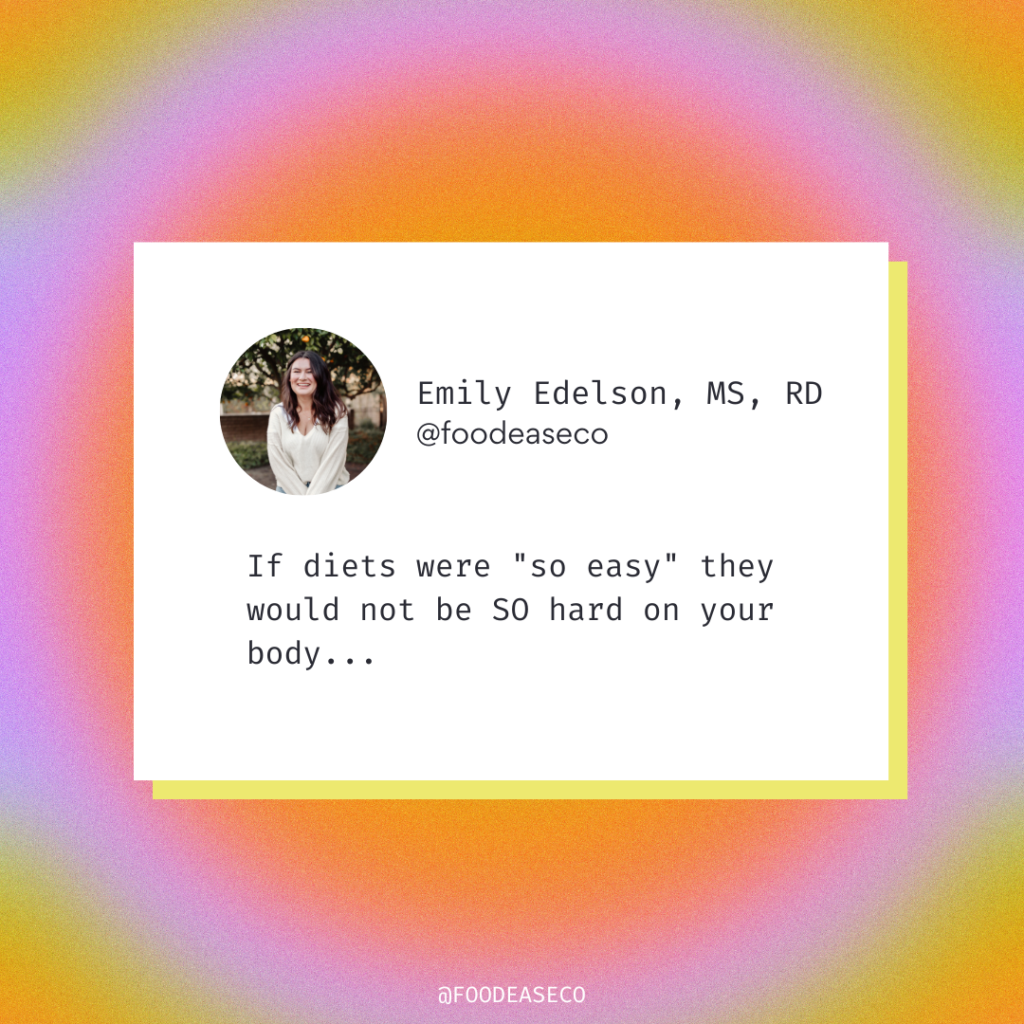Effects of Weight Cycling AKA “Yo-Yo Dieting”

Introduction
If you have been following us for a while you know that our brand Food Ease is all about finding food freedom through intuitive eating and ditching diet culture. We have discussed how harmful diet culture can be both mentally and physically however we have never really gone into the specifics of how weight cycling and yo-yo dieting can affect the body.
Weight cycling/yo-yo dieting is defined as bouts of weight loss and regain due to on and off dieting (What Is Weight Cycling?, n.d.). Generally, what happens with dieting is individuals go on restrictive diets, which go against all of the principles of intuitive eating. They may lose some weight along the way which is the “desired outcome” glorified by diet culture. Eventually, the individual will stop that certain diet whatever it may be (keto, low-fat, whole 30, Atkins, etc.) and 80 – 90% of those folks will gain back that weight within the next few months/years. The reason for this is defined as your “weight set point”. Your weight set point is the ideal weight that your body likes to be at. Your weight set point is determined by factors such as your genetics, hormones, and environment which are all unique to you. In gaining back weight individuals may feel a sense of shame and discouragement which then starts the diet cycle all over again.
When we start to manipulate our diets to change our body composition and weight we are essentially fighting against our body as it does not like to stray far from our set weight.
Besides causing our bodies to fight to stay at a comfortable weight, dieting has many other implications such as:
- Higher Risk of Fractures: Commonly with dieting individuals may be consuming inadequate amounts of certain food groups which can result in vitamin and mineral deficiencies (Villareal et al., 2015). For example, diet culture often demonizes foods containing fat; however, vitamin D, which is important for bone health, is commonly found in fat sources such as egg yolks and fortified dairy products (cheese, milk, butter). When we start to eliminate these foods, that is when we can run into trouble.
- Loss of Muscle Tissue: Oftentimes the goal of weight loss is to lose fat tissue however in doing so with calorie restriction, the body also starts to catalyze other tissues in the body such as the skeletal muscles, liver, kidney, and most importantly the heart (Weiss et al., 2017). The body does this due to a lack of energy from calorie restriction and starts to break down muscles in the body to release energy.
- Hypertension and Cardiovascular Disease: Weight cycling can cause fluctuations in blood pressure and heart rate which causes the heart to have an increased cardiac load which could result in cardiovascular disease.
- Diabetes: Long-term weight fluctuations interfere with glucose homeostasis, resulting in increased triglyceride and glucose levels creating a higher risk for diabetes (Park et al., 2019). Triglycerides are fat molecules found in the blood and having high triglyceride levels can also increase your risk for heart disease and stroke.
As you can see, the often-glorified weight loss in pursuit of better health can actually be detrimental to health. The above-mentioned implications you do not hear about from diet culture. We only ever hear about how being smaller and losing weight = being healthy, however, the research says otherwise.
Irritability, anxiety, depression, fatigue, and difficulty concentrating are all side effects of dieting. We also lose touch of our hunger and fullness cues and will generally lack satisfaction with our food. Dieting emphasizes disordered eating habits which can take years to find intuitive eating again.
Health does NOT come in a specific size. Health is at every size. We are healthiest when we are at a weight that is comfortable for our bodies. We are healthiest when we allow ourselves to enjoy the foods we want to without guilt or shame. We are healthiest when we learn to separate exercise from calories in vs calories out and instead engage in joyful movement that excites us.
If you are looking to end the cycle and stop dieting for good, the dietitians at Food Ease Co. can help!
References:
Park, K. Y., Hwang, H. S., Cho, K. H., Han, K., Nam, G. E., Kim, Y. H., Kwon, Y., & Park, Y. G. (2019). Body weight fluctuation as a risk factor for type 2 diabetes: Results from a nationwide cohort study. Journal of Clinical Medicine, 8(7), 950. https://doi.org/10.3390/jcm8070950
Villareal, D. T., Fontana, L., Das, S. K., Redman, L., Smith, S. R., Saltzman, E., Bales, C., Rochon, J., Pieper, C., Huang, M., Lewis, M., & Schwartz, A. V. (2015). Effect of Two-Year caloric restriction on bone metabolism and bone mineral density in Non-Obese younger adults: A randomized clinical trial. Journal of Bone and Mineral Research, 31(1), 40–51. https://doi.org/10.1002/jbmr.2701
Weiss, E. P., Jordan, R. C., Frese, E. M., Albert, S. G., & Villareal, D. T. (2017). Effects of weight loss on lean mass, strength, bone, and aerobic capacity. Medicine & Science in Sports & Exercise, 49(1), 206–217. https://doi.org/10.1249/mss.0000000000001074
What is weight cycling? (n.d.). Christy Harrison – Intuitive Eating Dietitian, Anti-Diet Author, & Certified Eating Disorders Specialist. https://christyharrison.com/what-is-weight-cycling
Have a Question?


Do you have any questions or suggestions? Feel free to contact us! Just leave your email here, and we will get back to you shortly.